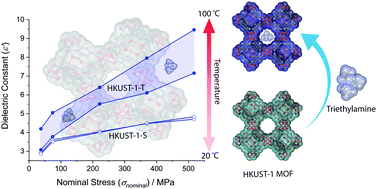Influence of mechanical, thermal, and electrical perturbations on the dielectric behaviour of guest-encapsulated HKUST-1 crystals†
Abstract
Metal–organic frameworks (MOFs) are emerging low-k dielectric materials for application in next-generation microelectronics and telecommunication devices. MOF dielectrics can function as smart sensors with high sensitivity and chemical selectivity, by leveraging the ubiquitous dielectric response of MOFs and overcoming the limitations of DC conductivity and fluorescence approaches. Herein we study the effects of material synthesis, applied mechanical stress (37–520 MPa), varying temperature (20–100 °C), and guest encapsulation on the frequency-dependent dielectric response (4 Hz to 1 MHz) and AC conductivity of the HKUST-1 MOF. Particularly, we show that the confinement of the triethylamine (NEt3) guest molecules in HKUST-1 (host) yields a NEt3@HKUST-1 system that is tuneable via mechanical, thermal and electrical perturbations. Within the frequency range of 10 kHz to 1 MHz, at 20 °C, we show that the dielectric constant (ε′) of the guest-encapsulated system could be tuned to attain a value in the range of 2.8 to 7.2; at 100 °C, an even greater value of ε′ in the range of 3.1 to 9.5 could be achieved. Conversely, we found that the dielectric tuneability of the porous (guest-free) HKUST-1 is relatively more limited (ε′ = 2.8 to 4.9) whilst employing the same operational parameters. Furthermore, the confinement of guest molecules in HKUST-1 enhances the mechanical resilience and yield strength of the powders subject to a compressive pelleting stress. Together, the results elucidate the new potential for exploiting host–guest interactions in MOFs, coupled with electrical, thermal, and mechanical stimuli to regulate the precise dielectric response of a designer low-k material.



 Please wait while we load your content...
Please wait while we load your content...